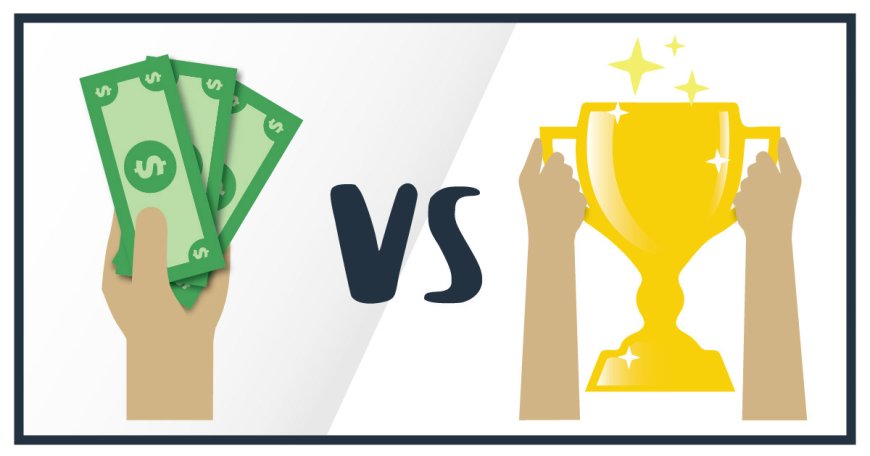Award vs. Reward: Understanding the Distinctions and Their Impact
In this blog, we will delve into the nuances of awards and rewards, shedding light on their differences, and exploring when and how they are appropriately used. Understanding these distinctions can be crucial, as they play a significant role in motivating and recognizing individuals in various aspects of life, from the workplace to personal achievements.to know more about Award VS Reward read full article presented you by Examrewards.com

Award vs. Reward: Understanding the Distinctions and Their Impact
In this blog, we will delve into the nuances of awards and rewards, shedding light on their differences, and exploring when and how they are appropriately used. Understanding these distinctions can be crucial, as they play a significant role in motivating and recognizing individuals in various aspects of life, from the workplace to personal achievements.to know more about Award VS Reward read full article presented you by Examrewards.com
TABLE OF CONTENT :-
· Introduction
· The Essence of Awards
· The Dynamics of Rewards
· When to Use Awards and Rewards
· Conclusion: Striking the Balance Between Awards and Rewards
Introduction
In our journey through life, we often encounter the terms "award" and "reward," both of which hold significant places in various aspects of human interactions and achievements. At first glance, these words might appear synonymous, often used interchangeably. However, delving deeper, we find that awards and rewards are distinct concepts with unique purposes and implications. In this blog post, we will explore these distinctions, highlighting their effectiveness and impact
Awards are emblematic of recognition and honor, bestowed upon individuals or entities to celebrate their accomplishments, contributions, or excellence in a specific field or domain. To truly grasp the essence of awards, let's examine their core attributes:
Awards are not merely tokens or trinkets; they are powerful symbols of recognition. They serve as a testament to exceptional achievements and endeavours. Receiving an award validates an individual's dedication, hard work, and commitment to their chosen path.
2. Merit-Based Recognition
One of the defining characteristics of awards is their merit-based nature. Award recipients undergo a rigorous evaluation process, often subject to scrutiny by judges, experts, or peers. The criteria for selection are objective and specific, ensuring that only the most deserving individuals or entities are honoured.
Awards confer enduring significance upon their recipients. Winning a prestigious award can elevate one's profile, enhance credibility within their respective field, and even open doors to new opportunities. It's not just a momentary accolade; it's a lifelong distinction.
While awards may come with a physical trophy, certificate, or medal, their primary value is not monetary. They are not designed to provide material benefits but rather to acknowledge and celebrate excellence.
Awards play a pivotal role in inspiring others. They are not just about celebrating past achievements but also about setting benchmarks for future excellence. The pursuit of awards encourages individuals and organizations to reach for greater heights.
Consider some renowned examples of awards:
- Academy Awards (Oscars): The Oscars are synonymous with excellence in the film industry. Winning an Oscar can catapult an actor or filmmaker into superstardom and open doors to further career opportunities.
- Pulitzer Prize: The Pulitzer Prize acknowledges outstanding achievements in journalism, literature, and musical composition. It serves as a benchmark for excellence in these fields.
- Olympic Gold Medal: The pinnacle of athletic achievement, an Olympic gold medal signifies not only physical prowess but also the culmination of years of relentless training and dedication.
- Employee of the Year: In the corporate world, the "Employee of the Year" award recognizes outstanding contributions and commitment. It motivates employees to excel and sets a high standard for others to follow.
The Dynamics of Rewards
Rewards, in contrast to awards, are primarily incentive-based tools. They are designed to motivate and encourage specific behaviors, actions, or accomplishments. Let's explore the core characteristics of rewards:
Rewards serve as potent motivators. They are the proverbial carrots dangled before individuals or groups, enticing them to achieve specific goals, exhibit desired behaviors, or meet predetermined targets.
Rewards come in a variety of forms, offering flexibility in their application. They can be monetary bonuses, gifts, promotions, extra vacation days, or any tangible benefits designed to induce specific actions or behaviors.
In contrast to awards, rewards are generally short-term in nature. They provide immediate gratification, reinforcing positive behaviors or outcomes in the present moment. This short-term focus can be highly effective in driving desired actions.
Unlike awards, rewards are not exclusively tied to merit or exceptional achievement. They can be granted for meeting specific targets, completing tasks, or participating in activities, irrespective of overall performance.
Rewards excel in the realm of goal setting and achievement. They provide individuals with tangible incentives to strive for success, enhancing their productivity and performance.
Real-world examples of rewards in action include:
- Loyalty Program Discounts: Many businesses offer rewards through loyalty programs, where customers receive discounts, free products, or exclusive offers for their continued patronage. These rewards foster customer loyalty and drive repeat business.
- Student Participation Prizes: Educational institutions often use rewards to encourage student participation in extracurricular activities, such as clubs, sports, or community service. These incentives promote a well-rounded education and personal growth.
- Sales Incentives: Sales teams are frequently incentivized with rewards like cash bonuses, trips, or prizes for meeting or exceeding sales targets. Such incentives boost sales performance and motivate salespeople.
- Promotional Giveaways: Companies often offer rewards like free merchandise or gifts as part of promotional campaigns. These rewards attract customers, increase brand visibility, and stimulate sales.
Balancing the Scales: When to Use Awards and Rewards
When to Use Awards:
Long-Term Recognition: Awards carry a sense of enduring significance. They are well-suited for recognizing achievements that have a lasting impact and can inspire future generations.
Objective Evaluation: Awards should be employed when there is a clear, merit-based evaluation process in place. They are most meaningful when recipients are chosen based on well-defined criteria.
Inspiration and Aspiration: Awards are potent motivators. They serve not only as recognition but also as inspiration for others to strive for excellence in their chosen pursuits.
When to Use Rewards:
Behavioral Incentives: Rewards are effective when you want to motivate individuals or teams to take specific actions or achieve particular goals. They are excellent tools for encouraging desired behaviors.
Short-Term Goals: Rewards are well-suited for short-term objectives. Use them to provide immediate incentives and maintain momentum toward a specific target.
Diverse Motivational Strategies: In situations where merit may not be the primary factor, or where a range of motivational strategies is needed, rewards can be a versatile choice.
Promoting Participation: Use rewards to encourage participation in activities or programs. They can attract interest and engagement, even if the activity itself is not inherently rewarding.
Conclusion: Striking the Balance Between Awards and Rewards




